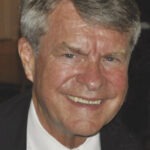By Rabbi Jeffrey Lipschultz
May has arrived and most of us in Wildwood are excited that we get the best summer excitement in the world. With our lovely beaches and exciting boardwalk, people from all over the world come to our town to experience the great joy of summer. We begin summer with the freedom of time as we get ready for much-needed vacations. Some of us have less freedom now but have the joy of thriving summer businesses. May, for us Jews, is also a time for learning as we prepare for Shavuot, the holiday commemorating the Torah being received by Moses on Mount Sinai and brought to the Israelites. We will have at Beth Judah Temple our first Tikun Le’il Shavuot on May 28 at 7:30 p.m. where we will learn about the Jewish concept of heaven, hell, and the holiday of Shavuot.
Shavuot is the festival celebrating God’s revelation of Torah, and has become one of Judaism’s hidden jewels. Far more Jews observe Yom Kippur or Passover than stay up to midnight on Shavuot to learn, as is tradition. What makes this relative obscurity all the more unfortunate is that the notion of God giving the Torah to the Jewish people is at the center of Judaism in every age, and remains so in every contemporary expression of Jewish religion.
While the idea of revelation is at everyone’s core, the exact nature of that revelation has always been a debate and a rich discussion amongst those who study Torah. One of the debates we are experiencing within our faith is the issue of revelation and its importance in our faith. In what way did God make divine will known at Mt. Sinai, and in what way do we come to know God’s will for today?
At one end of the debate are those who claim that each and every word in the Torah is literally God’s word. Not only the words of the Torah, but subsequent prophecies by Israel’s prophets, and subsequent rulings by rabbinic sages are all understood as being given by God at Mt. Sinai.
The other extreme is to see revelation as all encompassing so as to become almost meaningless. This view sees the will of God in everything that happens, in all literature, in art, in music, even in important movies. If everything emerges from the will of God, then no single path to God can serve as a reliable vehicle for piety and obedience. This seems to take away the importance of our Torah. Even though I love movies and literature I don’t agree with this view of faith.
The view I, and many in the conservative movement believes flows out of our rational and our traditional views. Conservative Judaism has always been somewhere in the middle of these two extremes, asserting that the Torah and subsequent traditions do embody the will of God, without necessarily insisting that each and every word is literally God’s own. To the contrary, Judaism affirms the essential role that human beings play in bringing God’s revelation to light. The role for humanity is to carry our historical liturgy and have it connect into the meaning in our lives today making everything meaningful.
Just before the beginning of the reading of the 10 Commandments, found in this festival’s Torah portion, the Torah records that “God spoke all these words, saying…”The rabbis of Midrash Sh’mot Rabbah notice an apparently unnecessary word: “all.” Wouldn’t the sentence have worked just as well without it? And if so, then what was intended by its insertion? What additional lesson is the Torah trying to teach?
The midrash responds that this phrase indicates that every generation has a voice in how God’s word from Sinai is translated into life: “These are the souls that will one day be created…although they did not yet exist, still each one received his share of the Torah. Not only did all the prophets receive their prophecy from Sinai, but also each of the Sages that arose in every generation received his wisdom from Sinai.” Sinai becomes our metaphor for finding the essential nature of God expressed though the brilliance of his words. That is the true revaluation.
This is the essential role of our faith on this unique holiday. We have an opportunity to find this deep connection to our faith in God and our Torah with questions of the great sages and our own points of view. We can see farther than the sages when we allow ourselves to stand on the shoulders of their greatness. We learn more when we have our minds open and question, yet we must always make ourselves the center of the argument when we receive the Torah and make it part of our lives.
The power of God’s voice resonates whenever Jews study and live our sacred traditions, whenever rabbinic sages argue about new phenomenon or seek to apply Judaism in new ways. In all of those instances, we touch base again with the mysterious power of encountering God afresh, a new Sinai that recurs over and over again whenever Jews harvest their heritage anew.
This is the ideal that we hope to celebrate on May 28 and the following Shabbat morning of May 30 as we prepare once again to accept the Torah as the principal of our faith. I hope to see you all Shavuot weekend as we experience our first Tikun on Thursday and holiday services on Saturday.
Have a Chag Semaiach
Rabbi Jeffrey Lipschultz is the spiritual leader Beth Judah Temple in Wildwood. He welcomes your comments at dvjewish@rof.net







